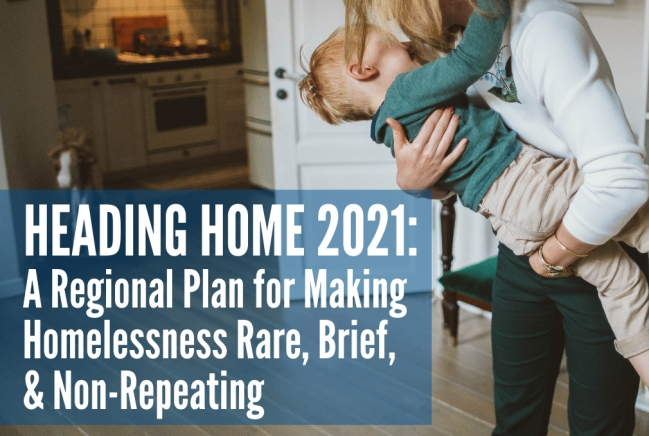United Way of Monroe County, the Community Foundation of Bloomington and Monroe County, and the South Central Housing Network (SCHN) are pleased to announce the release of “Heading Home 2021: A Regional Plan for Making Homelessness Rare, Brief, and Non-Repeating.” This plan will serve as a community guide to support long-term initiatives in reducing and eliminating regional housing insecurity and homelessness in Monroe County.
In early 2021, United Way and the Community Foundation began meeting with a small group of community organizations to understand the underlying challenges that have prevented Monroe County from fully achieving goals outlined in the 2014 Heading Home Plan. An analysis of that plan indicated that while many organizations and entities have been deliberately and tirelessly working to advance housing security, there had not been a county-wide mechanism to coordinate and make the best use of the many assets throughout our region to ultimately achieve the full complement of results intended in the 2014 plan.
In response, a Housing Insecurity Working Group was convened in February to revisit the 2014 plan, assess the community’s current issues surrounding housing insecurity, and create an updated plan for 2021 and beyond. Comprised of more than 60 members, representing nearly 30 local and regional organizations, the Working Group looked at systemic root causes while ensuring that the voices of those with lived experience are lifted, heard, and valued.
“Housing insecurity and homelessness impact all too many of our community members. We have many wonderful service providers, each filled with caring people who do this work day in and day out. We are grateful for the opportunity to bring them together, alongside elected officials, philanthropic partners, and other key stakeholders, to work jointly on the systemic level,” said United Way Executive Director Efrat Feferman.
Regional partners, including service providers, government officials, community members, and funders, were instrumental to this process. Financial support from Bloomington Township, City of Bloomington, Monroe County Government, and Perry Township has supported the planning and coordination of the effort to date.
In the past few months, three Working Group sub-committees researched service delivery gaps and promising solutions. The Data and Dashboard committee reviewed existing information to identify what data providers currently track and what is most significant to measuring progress. The Map and Gap committee reviewed services associated with proximal causes of housing insecurity and identified gaps in these services. Finally, the Promising Practices committee identified holistic best practices for housing security in place in other communities.
Initial recommendations included improving data collection and sharing, filling gaps in services, and implementing best practices were incorporated into the plan. In addition, the sub-committees recommended that the updated plan focus on implementing regional solutions to reducing homelessness, increasing affordable housing, increasing access to skilled case managers, and providing effective and expeditious strategies for addressing acute housing issues.
All of the recommendations were distilled into a new Heading Home plan that centers around a collective impact response following the Housing First model. Housing First, at its core, is the broad philosophy to house people impacted by homelessness as quickly as possible. Having stable housing creates a foundation that better equips households to address the underlying issues that resulted in housing insecurity and/or homelessness.
As Emily Pike, Executive Director of New Hope for Families and chair of the South Central Housing Network explains, “There just aren’t any causes of homelessness that are naturally or easily resolved during a period of homelessness. The Housing First model tells us to put first things first and get individuals and families into stable housing, so they can work on the next thing. It’s a philosophy many of our highly-skilled local service providers have been working to integrate for several years, and we are excited to welcome more community members into this vital work.”
The Heading Home 2021 Plan also recommends the creation of an entity to guide implementation strategies and ensure a coordinated countywide response. This entity will provide leadership, accountability, and ensure that broad stakeholder engagement is sustained through a Housing Insecurity Coalition.
United Way of Monroe County, the Community Foundation, SCHN, and the Working Group will continue to move forward to create a sustainable infrastructure to support this work. This process includes seeking support for the long-term implementation of this plan and strategy.
“The completion of the Heading Home 2021 plan is an important step for Monroe County and our region,” said Community Foundation President and CEO Tina Peterson. “Through a cross-sector approach, we have co-designed a uniquely relevant plan that offers a roadmap for moving forward in creating greater housing security for individuals and families. It’s a goal shared by many, one that must become reality for this community to thrive.”
To read the plan, click here.
To learn more about the Housing Insecurity Working Group, click here.
About United Way of Monroe County: United Way of Monroe County is a nonprofit organization that improves people’s lives by addressing critical needs today and working to reduce those needs tomorrow. Through its Community Action Fund and grant initiatives, United Way works with 24 member agencies and community partners to ensure families have opportunities and everyone can meet basic living needs. Learn more: https://www.monroeunitedway.org
About the Community Foundation of Bloomington and Monroe County: Created by individuals, families, and businesses who share a passion for Monroe County and a vision for its future, the Community Foundation of Bloomington and Monroe County has granted $27 million to local nonprofit organizations since its incorporation in 1990. With a growing $41.1 million endowment, the Foundation makes a difference by connecting caring people, important causes, and community resources.

